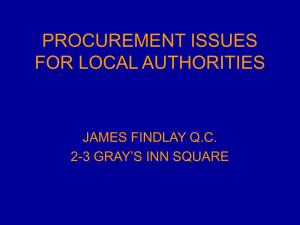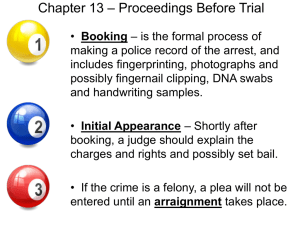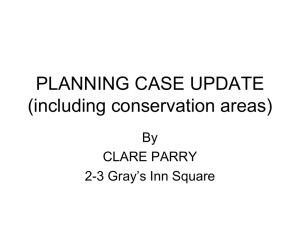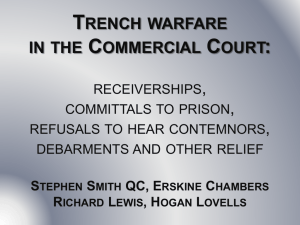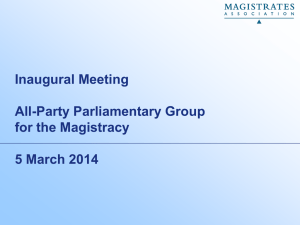Representing the Feral Youth
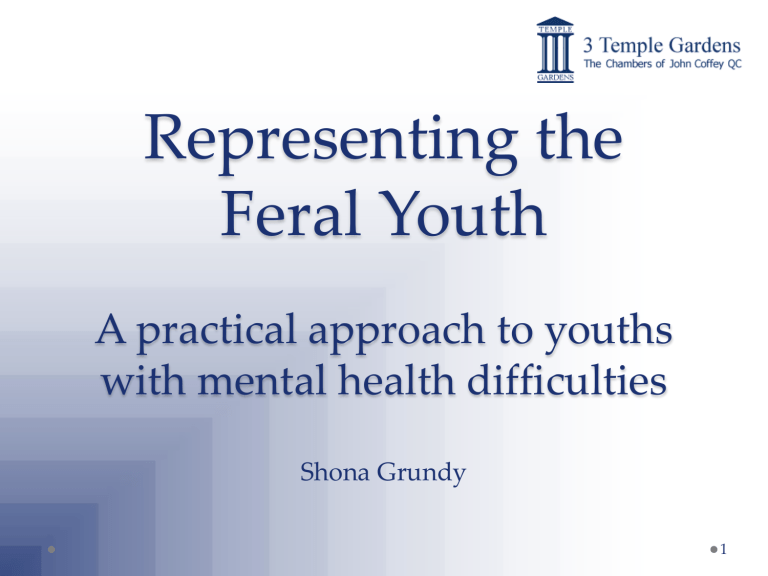
Representing the
Feral Youth
A practical approach to youths with mental health difficulties
Shona Grundy
1
Why the ‘Feral’ Youth?
2
Riots 2011
• Instant political and media perception was in fact a misconception
• Riots were organised by ‘gangs’. o Initial estimates suggested that 25% of people arrested were gang affiliated. o When figures were re-evaluated true figure was in fact 13%
• Rioters were the ‘feral youth’ o By 8 th June 2012 3,051 people had been put before the courts on riot related charges.
o In London the number of people prosecuted by the same date was 2,194 o 74% adults and 26% juveniles
3
Misconceptions in the
Youth Court
4
Lecture Content
• Practice & procedure of representing youth defendants in the youth court where there is concern as to his/her mental capacity
1. Fitness to plead in the Youth Court
1. Effective participation
5
Fitness to Plead
• Well known test – R v Pritchard (1836) 7 C&P 303 o Ability to understand the charge(s) o Ability to decide whether to plead guilty or not guilty o Ability to follow the course of proceedings o Ability to instruct a lawyer o Ability to challenge a juror o Ability to give evidence in his/her own defence
• Court can find unfitness to plead if the defence can establish that on a balance of probabilities any one of the six criteria is beyond the defendant’s capabilities (R v M
(John) [2003] EWCA Crim 3452)
6
Importance of Background
• Why knowing your client’s background can be so important.
• Where can you get useful information: o Parents/Family o Looked after Child o Youth Offending Team o Education o GP
• Prior authority
7
Which Expert?
Psychologist Psychiatrist
• Medically trained • Degree and Postgraduate qualification
• Mental state examination
• General human behaviour
• Diagnosis of mental disorder
• Functioning, personality and development
• Interview and observation
• Only a psychologist can IQ test
• Section 12 approved under MHA
1983
• Can prescribe medication
8
Psychological Conditions
Condition Relevance
• Learning Disability
• Autism Spectrum Disorder (inc.
Aspergers Syndrome)
• Attention Deficit Hyperactive
Disorder
• Post Traumatic Stress Disorder
• Understanding evidence/charge
• Giving evidence or the actual offence
• Regular breaks, explain fidgeting, etc
• Mitigation
9
Psychologist
• Wechsler Intelligence Scale for Children IV
• Covers age range 6 to 16 years and 11 months
• Full IQ test which is different to the adult test and represents a child’s general cognitive ability
• The Crime and Disorder Act 1998, s.34 – Doli incapax
(‘Neuroscience and the Law’ – The Royal Society)
10
Psychiatric Conditions
• Mental illness - DSM-IV / ICD-10 o Schizophrenia o Bi-polar (manic depressive) o Drug induced psychosis o Personality disorders
11
Experts
• Clearly set out what you want the expert to consider
• Areas not to be discussed
• Offence in hypothetical
• Expert works for the court not you
• Make the need to see a draft and discuss report clear
• Unethical to exclude parts afterwards but can make amendments
12
Typical Requests
• Fitness to plead (set out Pritchard criteria)
• Effective participation – Grisso
• Suggestibility and Compliance – Gudjonsson
• Suggestibility – likelihood of yielding to investigative pressure. Interview?
• Compliance – likelihood of acting under duress
• Vulnerability to a custodial setting
• Specific issues to your client
13
Fitness to Plead in the Youth Court
• As in the Magistrates’ Court, there is no specific procedure by which a person’s fitness to plead may be determined in the Youth Court.
• Grave Crime: o representations that the justices should decline jurisdiction as Crown Court is the more appropriate venue
• Summary Trial o R v Barking Youth Court [2002] EWHC Admin 734 o Varma v Redbridge Magistrates Court [2009] EWHC 836 (Admin)
14
• The procedure is provided for by a combination of the
MHA 1983, s.37(3) and the PCC(S)A 2000, s.11(1)
• s.37(3) provides:
“Where a person is charged before a Magistrates’ court with any act or omission as an offence and the court would have the power, on convicting him of the offence to make a hospital or guardianship order under subsection (1) above in his case, then if the court is satisfied that the accused did the act or made the admission charged the court may, if it thinks fit, make such an order without convicting him.”
• Mental illness or severe mental impairment
• CPS v P [2007] EWHC 946 (Admin) – guidance on the approach to be taken in the Youth Court
15
Youth Court Disposals
• s.37(1) MHA 1983 – Hospital Order or Guardianship
Order
• Restriction Order – Youth Court has no power if no conviction. If there is a conviction, then if over 14 has to be committed to the Crown Court (s.43 MHA 1983)
• Where no conviction, no absolute discharge available in
Youth Court
• Guardianship Order not available to those under 16.
Therefore no community disposal available
16
Effective Participation
• T and V v UK [2000] All ER 1024
It is essential that a child charged with a criminal offence is dealt with in a manner which takes full account of his age, level of maturity and intellectual and emotional capacities, and that steps are taken to promote his ability to understand and participate in the proceedings
• Crown Court Practice Direction [2007] 1 WLR 1790
17
Abuse?
• SC v UK (2005) 40 EHRR 10 o 11 yrs old with significant learning disabilities (intellectual capacity of an 8 yr old) o CC trial – application to stay on grounds of abuse/breach of Article 6 failed o ECHR found that there had been a violation of Article 6(1)
• R(P) v West London Youth Court [2005] EWHC 2583 (Ad) o Standard of proof when determining question of whether trial of youth with limited intellectual capacity would be an abuse of process on ground that he would be unable to extent required by Article 6 is balance of probabilities o Crucial question – can procedures be adopted that allow the defendant to participate effectively o P was 15 yrs old with the IQ of an 8 yr old. o HC held that DJ right not to grant stay. o SC v UK distinguished on basis that he was tried in CC rather than YC
18
• CPS v P [2007] EWHC 946 (Admin) o Detailed guidance on procedure o Youth Court should first consider whether there is a way in which, with modified procedures, the youth can ‘effectively participate’ o If decides that cannot effectively participate, then the Court should switch to consideration of whether the child has done the act(s) alleged.
o P was 11 yrs old with a mental age of just over 7 yrs o HC held that the DJ in the Youth Court had been wrong to stay proceedings when he did
19
Remedies
• R(P) v West London Youth Court [2005] EWHC 2583 (Ad) the HC listed ‘practical steps’ that could be taken: i.
Keeping the defendant’s level of cognitive functioning in mind; ii.
Using concise and simple language iii.
Having regular breaks iv.
Taking additional time to explain court proceedings v.
Being proactive in ensuring the defendant understands the ingredients of the charge vi.
Explaining the possible outcomes and sentences vii.
Ensuring that cross-examination is carefully controlled so that questions are short and clear and frustration is minimised
20
Special Measures
• Live Link: o YJCEA 1999 s.33a-c; Police and Justice Act 2006 – Came into force on 15 th Jan 2007 o The Court may, on the application of the accused if a youth, give a live link direction – only if his ability to participate effectively in the proceedings as a witness giving oral evidence in court is compromised by his level of intellectual
ability or social functioning and it is in the interests of justice and the live link would allow him to participate more effectively o The Court can order that the defendant be present for his trial via live link – not just for the giving of evidence. R v Ukpabio [2007] EWCA Crim 2108
21
Special Measures
• Intermediaries o YJCEA 1999 special measures regime does not include the accused o Common law power – R (on the application of C) v Sevenoaks Youth Court [2009]
EWHC 3088 (Admin) o Government responded with s.104 Coroners and Justice Act 2009 – unlikely to come into force o Test: Where accused is a youth when the application is made, the condition is that the accused’s ability to participate in the proceedings as a witness giving oral evidence in court is compromised by the accused’s level of intellectual ability or social functioning
22
Registered v Unregistered
• Register is controlled by MOJ. Defence not afforded access to it
• Registered intermediaries are: o Selected o Trained (5 days) o Examined o CRB checked o Regulated by a code of conduct o Have a formal complaints system
• May be situation where unregistered intermediary more appropriate
• R v G P & 4 others, Leeds Crown Court, 20 July 2012
23
The End
Enjoy lunch
24
